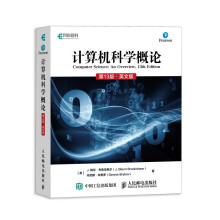计算机科学概论 第13版 英文版

Chapter 0 Introduction / 绪论 2
0.1 The Role of Algorithms / 算法的作用 4
0.2 The History of Computing / 计算机器的由来 6
0.3 An Outline of Our Study / 学习大纲 11
0.4 The Overarching Themes of Computer Science / 计算机科学的首要主题 13
Chapter 1 Data Storage / 数据存储 24
1.1 Bits and Their Storage / 位和位存储 26
1.2 Main Memory / 主存储器 34
1.3 Mass Storage / 海量存储器 37
1.4 Representing Information as Bit Patterns / 用位模式表示信息 43
*1.5 The Binary System / 二进制系统 51
*1.6 Storing Integers / 整数的存储 56
*1.7 Storing Fractions / 小数的存储 63
*1.8 Data and Programming / 数据与程序设计 69
*1.9 Data Compression / 数据压缩 77
*1.10 Communication Errors / 通信差错 83
Chapter 2 Data Manipulation / 数据操控 96
2.1 Computer Architecture / 计算机体系结构 98
2.2 Machine Language / 机器语言 101
2.3 Program Execution / 程序执行 108
*2.4 Arithmetic/Logic Instructions / 算术/逻辑指令 116
*2.5 Communicating with Other Devices / 与其他设备通信 121
*2.6 Programming Data Manipulation / 数据操控编程 126
*2.7 Other Architectures / 其他体系结构 137
Chapter 3 Operating Systems / 操作系统 148
3.1 The History of Operating Systems / 操作系统的历史 150
3.2 Operating System Architecture / 操作系统的体系结构 155
3.3 Coordinating the Machine’s Activities / 协调机器的活动 163
*3.4 Handling Competition Among Processes / 处理进程间的竞争 166
3.5 Security / 安全性 172
Chapter 4 Networking and the Internet / 组网及因特网 182
4.1 Network Fundamentals / 网络基础 184
4.2 The Internet / 因特网 194
4.3 The World Wide Web / 万维网 206
*4.4 Internet Protocols / 因特网协议 215
*4.5 Simple Client Server / 简单的客户机服务器 223
4.6 Cybersecurity / 网络安全 227
Chapter 5 Algorithms / 算法 244
5.1 The Concept of an Algorithm / 算法的概念 246
5.2 Algorithm Representation / 算法的表示 249
5.3 Algorithm Discovery / 算法的发现 258
5.4 Iterative Structures / 迭代结构 265
5.5 Recursive Structures / 递归结构 276
5.6 Efficiency and Correctness / 效率和正确性 285
Chapter 6 Programming Languages / 程序设计语言 304
6.1 Historical Perspective / 历史回顾 306
6.2 Traditional Programming Concepts / 传统的程序设计概念 317
6.3 Procedural Units / 过程单元 332
6.4 Language Implementation / 语言实现 340
6.5 Object-Oriented Programming / 面向对象程序设计 350
*6.6 Programming Concurrent Activities / 程序设计并发活动 357
*6.7 Declarative Programming / 说明性程序设计 360
Chapter 7 Software Engineering / 软件工程 374
7.1 The Software Engineering Discipline / 软件工程学科 376
7.2 The Software Life Cycle / 软件生命周期 379
7.3 Software Engineering Methodologies / 软件工程方法学 384
7.4 Modularity / 模块化 387
7.5 Tools of the Trade / 行业工具 396
7.6 Quality Assurance / 质量保证 405
7.7 Documentation / 文档 408
7.8 The Human-Machine Interface / 人机界面 410
7.9 Software Ownership and Liability / 软件所有权和责任 414
Chapter 8 Data Abstractions / 数据抽象 422
8.1 Basic Data Structures / 基本数据结构 424
8.2 Related Concepts / 相关概念 429
8.3 Implementing Data Structures / 数据结构的实现 432
8.4 A Short Case Study / 一个简短的案例 447
8.5 Customized Data Types / 定制的数据类型 452
8.6 Classes and Objects / 类和对象 456
*8.7 Pointers in Machine Language / 机器语言中的指针 458
Chapter 9 Database Systems / 数据库系统 470
9.1 Database Fundamentals / 数据库基础 472
9.2 The Relational Model / 关系模型 478
*9.3 Object-Oriented Databases / 面向对象数据库 489
*9.4 Maintaining Database Integrity / 维护数据库的完整性 492
*9.5 Traditional File Structures / 传统的文件结构 496
9.6 Data Mining / 数据挖掘 505
9.7 Social Impact of Database Technology / 数据库技术的社会影响 508
Chapter 10 Computer Graphics / 计算机图形学 518
10.1 The Scope of Computer Graphics / 计算机图形学的范围 520
10.2 Overview of 3D Graphics / 3D图形概述 523
10.3 Modeling / 建模 525
10.4 Rendering / 渲染 535
*10.5 Dealing with Global Lighting / 处理全局照明 547
10.6 Animation / 动画 550
Chapter 11 Artificial Intelligence / 人工智能 560
11.1 Intelligence and Machines / 智能与机器 562
11.2 Perception / 感知 567
11.3 Reasoning / 推理 574
11.4 Additional Areas of Research / 其他研究领域 586
11.5 Artificial Neural Networks / 人工神经网络 593
11.6 Robotics / 机器人学 598
11.7 Considering the Consequences / 后果的思考 601
Chapter 12 Theory of Computation / 计算理论 614
12.1 Functions and Their Computation / 函数及其计算 616
12.2 Turing Machines / 图灵机 619
12.3 Universal Programming Languages / 通用程序设计语言 623
12.4 A Noncomputable Function / 一个不可计算的函数 629
12.5 Complexity of Problems / 问题的复杂性 634
*12.6 Public-Key Cryptography / 公钥密码学 646
Appendixes 656
A ASCII / ASCII码 656
B Circuits to Manipulate Two’s Complement Representations / 用于处理二进制补码表示的电路 657
C Vole: A Simple Machine Language / 一种简单的机器语言 660
D High-Level Programming Languages / 高级程序设计语言 663
E The Equivalence of Iterative and Recursive Structures / 迭代结构与递归结构的等价性 665
F Answers to Questions & Exercises / 问题与练习答案 667
0.1 The Role of Algorithms / 算法的作用 4
0.2 The History of Computing / 计算机器的由来 6
0.3 An Outline of Our Study / 学习大纲 11
0.4 The Overarching Themes of Computer Science / 计算机科学的首要主题 13
Chapter 1 Data Storage / 数据存储 24
1.1 Bits and Their Storage / 位和位存储 26
1.2 Main Memory / 主存储器 34
1.3 Mass Storage / 海量存储器 37
1.4 Representing Information as Bit Patterns / 用位模式表示信息 43
*1.5 The Binary System / 二进制系统 51
*1.6 Storing Integers / 整数的存储 56
*1.7 Storing Fractions / 小数的存储 63
*1.8 Data and Programming / 数据与程序设计 69
*1.9 Data Compression / 数据压缩 77
*1.10 Communication Errors / 通信差错 83
Chapter 2 Data Manipulation / 数据操控 96
2.1 Computer Architecture / 计算机体系结构 98
2.2 Machine Language / 机器语言 101
2.3 Program Execution / 程序执行 108
*2.4 Arithmetic/Logic Instructions / 算术/逻辑指令 116
*2.5 Communicating with Other Devices / 与其他设备通信 121
*2.6 Programming Data Manipulation / 数据操控编程 126
*2.7 Other Architectures / 其他体系结构 137
Chapter 3 Operating Systems / 操作系统 148
3.1 The History of Operating Systems / 操作系统的历史 150
3.2 Operating System Architecture / 操作系统的体系结构 155
3.3 Coordinating the Machine’s Activities / 协调机器的活动 163
*3.4 Handling Competition Among Processes / 处理进程间的竞争 166
3.5 Security / 安全性 172
Chapter 4 Networking and the Internet / 组网及因特网 182
4.1 Network Fundamentals / 网络基础 184
4.2 The Internet / 因特网 194
4.3 The World Wide Web / 万维网 206
*4.4 Internet Protocols / 因特网协议 215
*4.5 Simple Client Server / 简单的客户机服务器 223
4.6 Cybersecurity / 网络安全 227
Chapter 5 Algorithms / 算法 244
5.1 The Concept of an Algorithm / 算法的概念 246
5.2 Algorithm Representation / 算法的表示 249
5.3 Algorithm Discovery / 算法的发现 258
5.4 Iterative Structures / 迭代结构 265
5.5 Recursive Structures / 递归结构 276
5.6 Efficiency and Correctness / 效率和正确性 285
Chapter 6 Programming Languages / 程序设计语言 304
6.1 Historical Perspective / 历史回顾 306
6.2 Traditional Programming Concepts / 传统的程序设计概念 317
6.3 Procedural Units / 过程单元 332
6.4 Language Implementation / 语言实现 340
6.5 Object-Oriented Programming / 面向对象程序设计 350
*6.6 Programming Concurrent Activities / 程序设计并发活动 357
*6.7 Declarative Programming / 说明性程序设计 360
Chapter 7 Software Engineering / 软件工程 374
7.1 The Software Engineering Discipline / 软件工程学科 376
7.2 The Software Life Cycle / 软件生命周期 379
7.3 Software Engineering Methodologies / 软件工程方法学 384
7.4 Modularity / 模块化 387
7.5 Tools of the Trade / 行业工具 396
7.6 Quality Assurance / 质量保证 405
7.7 Documentation / 文档 408
7.8 The Human-Machine Interface / 人机界面 410
7.9 Software Ownership and Liability / 软件所有权和责任 414
Chapter 8 Data Abstractions / 数据抽象 422
8.1 Basic Data Structures / 基本数据结构 424
8.2 Related Concepts / 相关概念 429
8.3 Implementing Data Structures / 数据结构的实现 432
8.4 A Short Case Study / 一个简短的案例 447
8.5 Customized Data Types / 定制的数据类型 452
8.6 Classes and Objects / 类和对象 456
*8.7 Pointers in Machine Language / 机器语言中的指针 458
Chapter 9 Database Systems / 数据库系统 470
9.1 Database Fundamentals / 数据库基础 472
9.2 The Relational Model / 关系模型 478
*9.3 Object-Oriented Databases / 面向对象数据库 489
*9.4 Maintaining Database Integrity / 维护数据库的完整性 492
*9.5 Traditional File Structures / 传统的文件结构 496
9.6 Data Mining / 数据挖掘 505
9.7 Social Impact of Database Technology / 数据库技术的社会影响 508
Chapter 10 Computer Graphics / 计算机图形学 518
10.1 The Scope of Computer Graphics / 计算机图形学的范围 520
10.2 Overview of 3D Graphics / 3D图形概述 523
10.3 Modeling / 建模 525
10.4 Rendering / 渲染 535
*10.5 Dealing with Global Lighting / 处理全局照明 547
10.6 Animation / 动画 550
Chapter 11 Artificial Intelligence / 人工智能 560
11.1 Intelligence and Machines / 智能与机器 562
11.2 Perception / 感知 567
11.3 Reasoning / 推理 574
11.4 Additional Areas of Research / 其他研究领域 586
11.5 Artificial Neural Networks / 人工神经网络 593
11.6 Robotics / 机器人学 598
11.7 Considering the Consequences / 后果的思考 601
Chapter 12 Theory of Computation / 计算理论 614
12.1 Functions and Their Computation / 函数及其计算 616
12.2 Turing Machines / 图灵机 619
12.3 Universal Programming Languages / 通用程序设计语言 623
12.4 A Noncomputable Function / 一个不可计算的函数 629
12.5 Complexity of Problems / 问题的复杂性 634
*12.6 Public-Key Cryptography / 公钥密码学 646
Appendixes 656
A ASCII / ASCII码 656
B Circuits to Manipulate Two’s Complement Representations / 用于处理二进制补码表示的电路 657
C Vole: A Simple Machine Language / 一种简单的机器语言 660
D High-Level Programming Languages / 高级程序设计语言 663
E The Equivalence of Iterative and Recursive Structures / 迭代结构与递归结构的等价性 665
F Answers to Questions & Exercises / 问题与练习答案 667
J.Glenn Brookshear:世界知名的计算机科学教育家。他在1975年获得墨西哥州立大学博士学位后,创立了Marquette大学的计算机科学学位项目,并在该校任教至今。他的主要研究方向是计算理论。著有Theory of Computation:Formal Languanges,Automata,and Complexity。
本书是计算机科学概论课程的经典教材,全书对计算机科学做了百科全书式的精彩阐述,充分展现了计算机科学的历史背景、发展历程和新的技术趋势。书中首先介绍信息编码及计算机体系结构的基本原理,进而介绍操作系统和组网以及因特网的相关内容,接着探讨算法、程序设计语言及软件工程,然后讨论数据抽象和数据库方面的问题,讲述图形学的主要应用以及人工智能,最后以计算理论的介绍结束全书。本书在内容编排上由具体到抽象逐步推进,便于教学安排,每一个主题自然而然地引导出下一个主题。此外,书中还包含大量的图、表和示例,有助于读者对知识的了解与把握。
第13版新增了Python相关的内容,并且继续使用第12版引入的Python代码示例和类Python伪代码。此外,几乎每一章都能看到对前一版对应章节的修订、更新以及修正。
本书非常适合作为高等院校计算机以及相关专业本科生教材,也可以供有意在计算机方面发展的非计算机专业读者作为入门参考。
第13版新增了Python相关的内容,并且继续使用第12版引入的Python代码示例和类Python伪代码。此外,几乎每一章都能看到对前一版对应章节的修订、更新以及修正。
本书非常适合作为高等院校计算机以及相关专业本科生教材,也可以供有意在计算机方面发展的非计算机专业读者作为入门参考。
比价列表价格走势
1人想要
公众号、微信群
 缺书网
缺书网微信公众号
 扫码进群
扫码进群实时获取购书优惠





